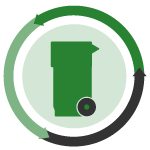
A local program practicing source separation describes its low-contamination advantage in light of Chinese import restrictions, and Orlando, Fla. is chosen as the site of a diversion-driving pilot project.

A local program practicing source separation describes its low-contamination advantage in light of Chinese import restrictions, and Orlando, Fla. is chosen as the site of a diversion-driving pilot project.
 Pennsylvania’s recycling stakeholders lobby to protect tens of millions of dollars in recycling money from being diverted, and a New Jersey company is fined after the death of an employee.
Pennsylvania’s recycling stakeholders lobby to protect tens of millions of dollars in recycling money from being diverted, and a New Jersey company is fined after the death of an employee.
 A barcode scanning innovation tells consumers the details on product recyclability, and a Canadian organization explains how the proposed materials ban in China could affect the recycling industry in one province.
A barcode scanning innovation tells consumers the details on product recyclability, and a Canadian organization explains how the proposed materials ban in China could affect the recycling industry in one province.
 A Canadian company acquires additional sorting facilities and a hauling operation, and a survey looks at how facilities handle glass.
A Canadian company acquires additional sorting facilities and a hauling operation, and a survey looks at how facilities handle glass.
 One global group wants your eclipse glasses for reuse, and a paper recycling plant in Canada is parted out and auctioned off.
One global group wants your eclipse glasses for reuse, and a paper recycling plant in Canada is parted out and auctioned off.
 Increasing incineration capacity across the pond has some recycling advocates concerned, and an Ohio municipality looks to return glass collection to residents.
Increasing incineration capacity across the pond has some recycling advocates concerned, and an Ohio municipality looks to return glass collection to residents.
 A lawsuit fails to stop a transition from dual-stream to single-stream collection in a city on Long Island, and a markets expert outlines some challenges that cartons bring to local recycling programs.
A lawsuit fails to stop a transition from dual-stream to single-stream collection in a city on Long Island, and a markets expert outlines some challenges that cartons bring to local recycling programs.
 Low commodity prices lead Australian recycling companies to stockpile recyclables, and a lack of multi-family recycling requirements turns recycling into a luxury amenity in Texas.
Low commodity prices lead Australian recycling companies to stockpile recyclables, and a lack of multi-family recycling requirements turns recycling into a luxury amenity in Texas.
 Houston will undergo another round of bidding from companies interested in sorting and selling its curbside recyclables, and the editor of a local paper gets a firsthand lesson in the problem of contamination.
Houston will undergo another round of bidding from companies interested in sorting and selling its curbside recyclables, and the editor of a local paper gets a firsthand lesson in the problem of contamination.
 Two large cities engage in cart-tagging campaigns to raise contamination awareness, and Maine’s container deposit drama continues with a state board refusing to ban the sale of small liquor bottles.
Two large cities engage in cart-tagging campaigns to raise contamination awareness, and Maine’s container deposit drama continues with a state board refusing to ban the sale of small liquor bottles.

